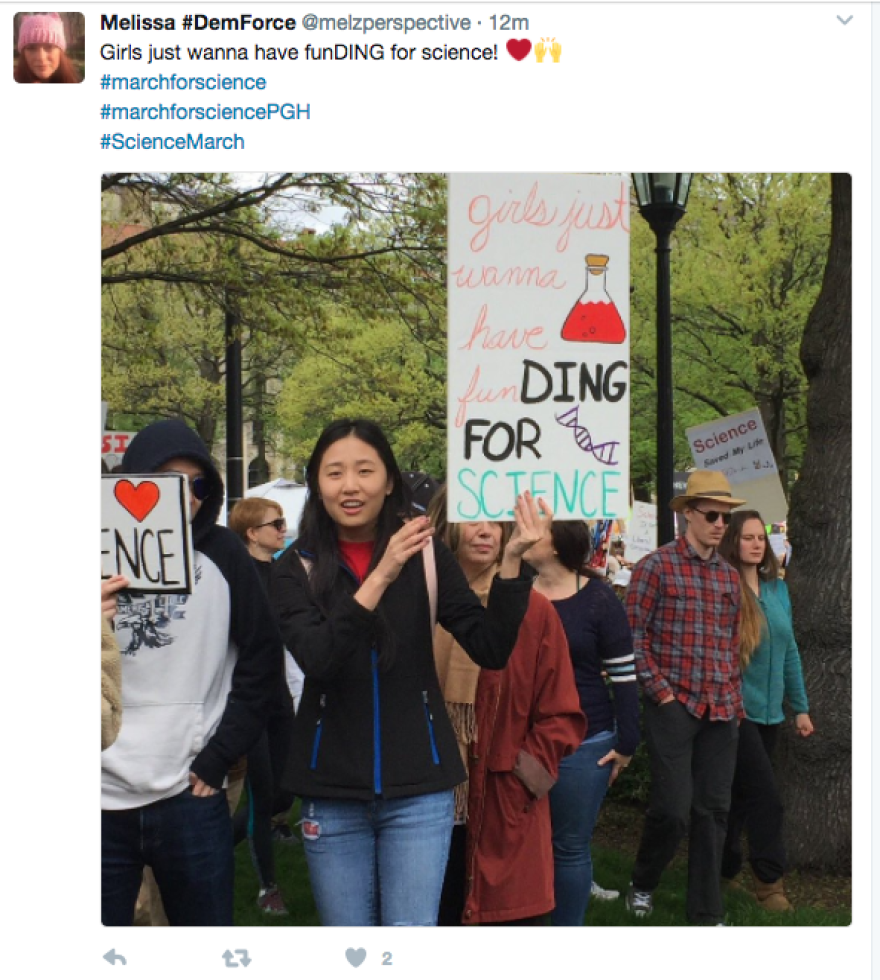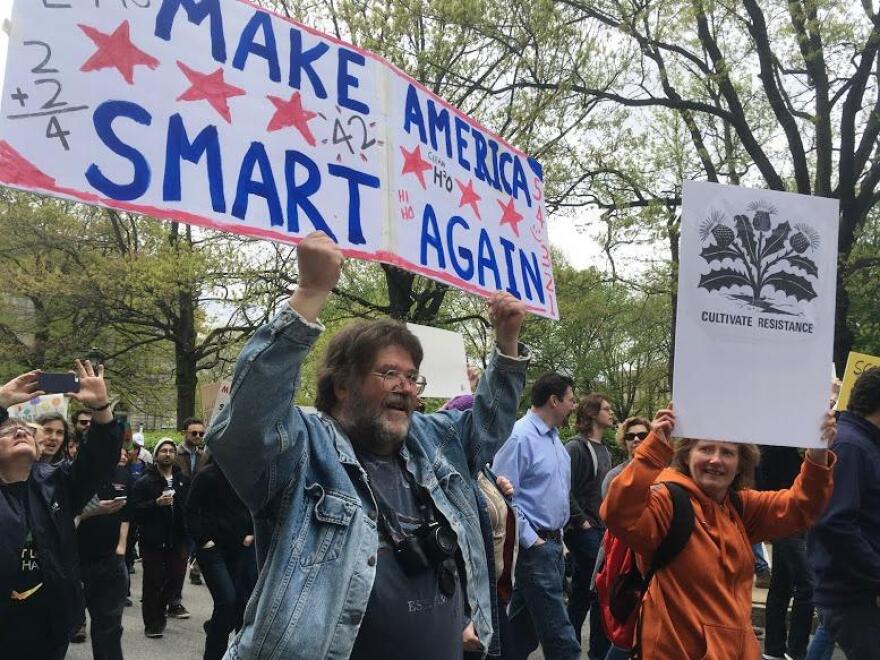Pittsburghers rallied in Oakland Saturday, in a satellite to the larger March for Science taking place in Washington, D.C. The city hasn’t released official crowd estimates, but organizers said thousands attended the march.
The local march itself was short, just seven-tenths of a mile around the block that houses the Cathedral of Learning on the University of Pittsburgh campus. Speeches, however, lasted more than an hour, as around a dozen scientists, academics and activists explained their work and its importance for people and the earth.
No speaker mentioned President Donald Trump by name. The closest approximation was Carnegie Mellon Philosophy professor Andy Norman's assertion that Republicans are anti-science.
"The most powerful political party in the entire world has set its sight on science as a target," he said.
However, several speakers did reference proposed budget cuts to scientific agencies such as the National Institutes of Health and the Environmental Protection Agency.

Geneticist Judith Yanowitz with the Magee-Women's Research Institute compared the budgets for those agencies to the costs of aircraft carriers and battleships.
"I am not saying defense is not important," she said. "It is, but so is the health and well-being of our citizens, and it must be funded."
Other speakers talked specifically about how cuts to research funding would affect their work. University of Pittsburgh psychiatry professor Ann Cohen works on Alzheimer's research and said proposed cuts to the NIH would significantly slow down the search for preventative treatments.
"You may have recently heard politicians arguing that you can cut the budget for NIH, because throwing money at a problem generally doesn't fix it," Cohen said. "Well, in the case of Alzheimer's disease, the greatest minds in our field argue that one of our biggest obstacles is having enough funding to get the research done."
Presumably, Cohen was referencing White House spokesperson Sean Spicer's defense of a proposed $6 billion cut to the NIH in 2018.
Speakers also talked more broadly about the culture they say the Trump administration has created, about "attacks on science" and a shift away from facts.

"We're living in a time where political opinion is replacing reasoned science with peer-reviewed publication. But the public doesn't read peer-reviewed publication," said Patricia DeMarco, who researches environmental and energy policy for both Carnegie Mellon University and Chatham University.
DeMarco said it's up to scientists to be on the "front lines," explaining to their friends, neighbors and legislators why small changes in global temperature can have an impact.
Issues of science education and equity and inclusion in the scientific community were also raised.
In a speech that was both enthusiastically delivered and received, software engineer and science educator Kelauni Cook asked the crowd to imagine five people from five different professions: rocket scientist, paleontologist, mechanical engineer, surgeon and architect.
Cook then went on to describe real women, people of color and disabled people in those professions, including NASA physicist and mathematician Katherine Johnson, whose work was celebrated in the film Hidden Figures.
"This is not just a march for the recognition of the importance of science. It has to be a march for the equity and access to science as well," Cook said. "It has to be a march for those little black kids in Homewood, and it has to be a march for those little refugee girls in the Hilltop, who are looking at the stars and wondering how they can build a rocket ship out of cardboard boxes."

But the speakers who followed spoke little about diversity in science, with the exception of University of Pittsburgh public health graduate student Abby Cartus, who asked people in the crowd to raise a fist in the air in a display of solidarity with people of color, women, LGBT people, the disabled and other minority groups.
Attendees at the rally were more inclined to specifically blame the Trump administration for what they see as an increasing governmental and cultural aversion to science, facts and reasoning.
Homemade signs reading "Make America smart again" and "Alternative energy, not alternative facts" make specific reference to the Trump administration and his campaign for the presidency.
"Our country is in danger with the policies of the Trump administration. Denial of science, denial of reality. So I'm here to protest. I'm not supportive of their agenda," said Bruce Hazen, 66, a retired nurse from Ellwood City.
Several people said they were surprised and dismayed that they would have to march to advocate for facts.
Emily Bennett, 34, a Science, Technology, Engineering and Math career counselor at the University of Pittsburgh said she was marching for her students.
"Before I used to take for granted that science was something that everyone believed in and respected and clearly things are changing and it's becoming political, so I think now is not the time to be silent," said Bennett.
Pittsburgh's march was one of more than 600 satellite marches around the world.
This story was updated at 1:55pm on Sunday, April 23 to include a crowd estimate from organizers.













